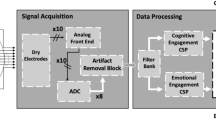Abstract
In the past decades intelligent mentoring systems have rapidly increased. In e-learning environment there has been an exponential growth in technological development environments and number of users that are addressed, hence an intelligent mentoring system should capture the user’s attention in order to improve results when focused in (e)learning tasks (i.e. serve both as a support of presence lessons and for distance form of studies – e-learning). It is important to note that the process of teaching-learning requires an interaction between the different actors involved: the tutor, the student, the expert domain and the learning environment or interface. In this paper we propose an innovative approach of an intelligent mentoring system that monitors the user’s biometric behaviour and measures his/her attention level during e-learning activities. Additionally, a machine learning categorisation model is presented that monitors students’ activity during school lessons. Nowadays computers are used as important working tools in many places, where we intend to use non-invasive methods of intelligent orientation through the observation of the user’s interaction with the computer.
Access this chapter
Tax calculation will be finalised at checkout
Purchases are for personal use only
Similar content being viewed by others
References
Bra, P.D., Calvi, L.: Aha! an open adaptive hypermedia architecture. New Rev. Hypermedia Multimedia 4(1), 115–139 (1998). https://doi.org/10.1080/13614569808914698
Brusilovsky, P., Peylo, C.: Adaptive and intelligent web-based educational systems. Int. J. Artif. Intell. Educ. 13(2–4), 159–172 (2003). http://dl.acm.org/citation.cfm?id=1434845.1434847
Carneiro, D., Novais, P.: Behavioral biometrics and ambient intelligence: new opportunities for context-aware applications. State Art AI Appl. Ambient Intell. 298, 68 (2017)
Durães, D., Bajo, J., Novais, P.: Assess and enhancing attention in learning activities. In: Auer, M.E., Guralnick, D., Simonics, I. (eds.) ICL 2017. AISC, vol. 715, pp. 803–811. Springer, Cham (2018). https://doi.org/10.1007/978-3-319-73210-7_93
Gomes, M., Oliveira, T., Silva, F., Carneiro, D., Novais, P.: Establishing the relationship between personality traits and stress in an intelligent environment. In: Ali, M., Pan, J.-S., Chen, S.-M., Horng, M.-F. (eds.) IEA/AIE 2014. LNCS (LNAI), vol. 8482, pp. 378–387. Springer, Cham (2014). https://doi.org/10.1007/978-3-319-07467-2_40
Gonçalves, F., Carneiro, D., Novais, P., Pêgo, J.: EUStress: a human behaviour analysis system for monitoring and assessing stress during exams. In: Ivanović, M., Bădică, C., Dix, J., Jovanović, Z., Malgeri, M., Savić, M. (eds.) IDC 2017. SCI, vol. 737, pp. 137–147. Springer, Cham (2018). https://doi.org/10.1007/978-3-319-66379-1_13
Heift, T.: Web delivery of adaptive and interactive language tutoring: revisited. Int. J. Artif. Intell. Educ. 26(1), 489–503 (2016). https://doi.org/10.1007/s40593-015-0061-0
Kegel, C.A., Bus, A.G.: Online tutoring as a pivotal quality of web-based early literacy programs. J. Educ. Psychol. 104(1), 182 (2012)
Mancas, M.: Computational attention towards attentive computers. Presses Universitaires de Louvain (2007)
Méndez Pozo, G.: Una arquitectura software basada en agentes y recomendaciones metodológicas para el desarrollo de entornos virtuales de entrenamiento con tutoría inteligente. Ph.D. thesis, Informatica (2008)
Mitrovic, A.: An intelligent SQL tutor on the web. Int. J. Artif. Intell. Educ. 13(2–4), 173–197 (2003). http://dl.acm.org/citation.cfm?id=1434845.1434848
Pimenta, A., Carneiro, D., Novais, P., Neves, J.: Monitoring mental fatigue through the analysis of keyboard and mouse interaction patterns. In: Pan, J.-S., Polycarpou, M.M., Woźniak, M., de Carvalho, A.C.P.L.F., Quintián, H., Corchado, E. (eds.) HAIS 2013. LNCS (LNAI), vol. 8073, pp. 222–231. Springer, Heidelberg (2013). https://doi.org/10.1007/978-3-642-40846-5_23
Rodrigues, M., Gonçalves, S., Carneiro, D., Novais, P., Fdez-Riverola, F.: Keystrokes and clicks: measuring stress on e-learning students. In: Casillas, J., Martínez-López, F., Vicari, R., De la Prieta, F. (eds.) Management Intelligent Systems. Advances in Intelligent Systems and Computing, vol. 220, pp. 119–126. Springer, Heidelberg (2013). https://doi.org/10.1007/978-3-319-00569-0_15
Tamiz, M., Karimi, M., Mehrabi, I., Ghidary, S.S.: A novel attention control modeling method for sensor selection based on fuzzy neural network learning. In: 2013 First RSI/ISM International Conference on Robotics and Mechatronics (ICRoM), pp. 7–13. IEEE (2013)
Yano, Y., Mitsuhara, H., Ochi, Y.: An adaptive web-based learning system with a free-hyperlink environment. In: Barker, P., Rebelsky, S. (eds.) Proceedings of EdMedia: World Conference on Educational Media and Technology 2002, pp. 1349–1350. Association for the Advancement of Computing in Education (AACE), Denver (2002). https://www.learntechlib.org/p/9991
Acknowledgement
This work has been supported by: SENESCYT - Universidad do Minho and Secretaría de Educación Superior, Ciencia, Tecnología e Innovación within the Project: SENESCYT-SDFC-DSEFC-2017-2855-O; Part-funded by ERDF– European Regional Development Fund and by National Funds through the FCT– Portuguese Foundation for Science and Technology within project NORTE-01-0247-FEDER-017832. The work of Filipe Gonalves is supported by a FCT grant with the reference ICVS-BI-2016-005.
Author information
Authors and Affiliations
Corresponding authors
Editor information
Editors and Affiliations
Rights and permissions
Copyright information
© 2018 Springer Nature Switzerland AG
About this paper
Cite this paper
Toala, R., Gonçalves, F., Durães, D., Novais, P. (2018). Adaptive and Intelligent Mentoring to Increase User Attentiveness in Learning Activities. In: Simari, G.R., Fermé, E., Gutiérrez Segura, F., Rodríguez Melquiades, J.A. (eds) Advances in Artificial Intelligence – IBERAMIA 2018. IBERAMIA 2018. Lecture Notes in Computer Science(), vol 11238. Springer, Cham. https://doi.org/10.1007/978-3-030-03928-8_12
Download citation
DOI: https://doi.org/10.1007/978-3-030-03928-8_12
Publisher Name: Springer, Cham
Print ISBN: 978-3-030-03927-1
Online ISBN: 978-3-030-03928-8
eBook Packages: Computer ScienceComputer Science (R0)




